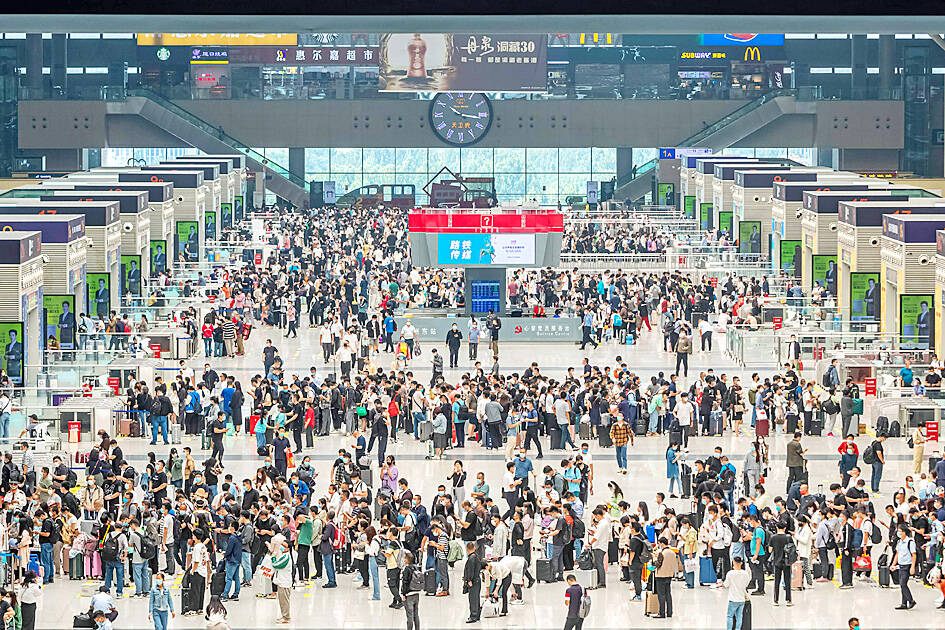Zhengzhou, the iPhone manufacturing hub, has locked down one of its most-populated districts to tame a COVID-19 flare-up, with creeping restrictions throughout China underscoring the constant threat of disruption companies face while the country sticks to “zero COVID.”
Almost 1 million residents of Zhongyuan District were ordered to stay at home starting yesterday, except for when they need to undergo COVID-19 testing, and non-essential businesses have been shut, a government notice said. The wider restrictions follow the lockdown of some neighborhoods last week, catching many people by surprise after officials had said there would not be a citywide lockdown.
IPhone maker Foxconn Technology Group’s plants are not located in the district that has been locked down. Representatives for the company did not immediately respond to a request for comment from Bloomberg News.

Photo: AFP
The city in Henan Province reported six new local cases for Sunday, down from a recent peak of 40 on Oct 9. Nationwide, cases declined to 697, the lowest in two weeks, as outbreaks in Inner Mongolia and Xinjiang came under control. Beijing posted 13 new cases, and Shanghai had 32.
China is sticking to the “zero COVID” pillars of lockdowns and mass testing to tame its biggest flare-up in two months, despite the heavy cost.
The policy has dragged on growth in the world’s second-biggest economy and roiled global supply chains as important manufacturing hubs — from vehicles to phones and Christmas trees — contend with the disruption of shutdowns and reopenings.
Chinese President Xi Jinping (習近平) on Sunday signaled no looming change to the approach, disappointing investors who had hoped for some signs of loosening. During a speech opening the twice-a-decade National Congress of the Chinese Communist Party in Beijing, he said the strict rules protect people’s lives, although Xi avoided mentioning the economic toll.
Economists surveyed by Bloomberg predict growth of just 3.3 percent this year, the second-weakest pace in more than four decades.
The stringent COVID-19 curbs have also been stoking public discontent. Censorship went into overdrive late last week, with words such as “Beijing” and “bridge” restricted on social media platforms like Sina Weibo after two banners criticizing Xi and zero COVID were displayed on a bridge in the capital.
One read: “We want food, not PCR [polymerase chain reaction] tests. We want freedom, not lockdowns and controls.”
While China’s most important cities have so far avoided large-scale lockdowns, officials have instead been quietly halting a growing list of activities.
Several schools in Shanghai have suspended in-person classes as the fear of infection spread grows, according to parents and social media posts. The port city of Tianjin last week announced a lockdown of one district and the southern megacity of Guangzhou shut schools in one area.

Auschwitz survivor Eva Schloss, the stepsister of teenage diarist Anne Frank and a tireless educator about the horrors of the Holocaust, has died. She was 96. The Anne Frank Trust UK, of which Schloss was honorary president, said she died on Saturday in London, where she lived. Britain’s King Charles III said he was “privileged and proud” to have known Schloss, who cofounded the charitable trust to help young people challenge prejudice. “The horrors that she endured as a young woman are impossible to comprehend and yet she devoted the rest of her life to overcoming hatred and prejudice, promoting kindness, courage, understanding

Tens of thousands of Filipino Catholics yesterday twirled white cloths and chanted “Viva, viva,” as a centuries-old statue of Jesus Christ was paraded through the streets of Manila in the nation’s biggest annual religious event. The day-long procession began before dawn, with barefoot volunteers pulling the heavy carriage through narrow streets where the devout waited in hopes of touching the icon, believed to hold miraculous powers. Thousands of police were deployed to manage crowds that officials believe could number in the millions by the time the statue reaches its home in central Manila’s Quiapo church around midnight. More than 800 people had sought

‘DISRESPECTFUL’: Katie Miller, the wife of Trump’s most influential adviser, drew ire by posting an image of Greenland in the colors of the US flag, captioning it ‘SOON’ US President Donald Trump on Sunday doubled down on his claim that Greenland should become part of the US, despite calls by the Danish prime minister to stop “threatening” the territory. Washington’s military intervention in Venezuela has reignited fears for Greenland, which Trump has repeatedly said he wants to annex, given its strategic location in the arctic. While aboard Air Force One en route to Washington, Trump reiterated the goal. “We need Greenland from the standpoint of national security, and Denmark is not going to be able to do it,” he said in response to a reporter’s question. “We’ll worry about Greenland in

PERILOUS JOURNEY: Over just a matter of days last month, about 1,600 Afghans who were at risk of perishing due to the cold weather were rescued in the mountains Habibullah set off from his home in western Afghanistan determined to find work in Iran, only for the 15-year-old to freeze to death while walking across the mountainous frontier. “He was forced to go, to bring food for the family,” his mother, Mah Jan, said at her mud home in Ghunjan village. “We have no food to eat, we have no clothes to wear. The house in which I live has no electricity, no water. I have no proper window, nothing to burn for heating,” she added, clutching a photograph of her son. Habibullah was one of at least 18 migrants who died